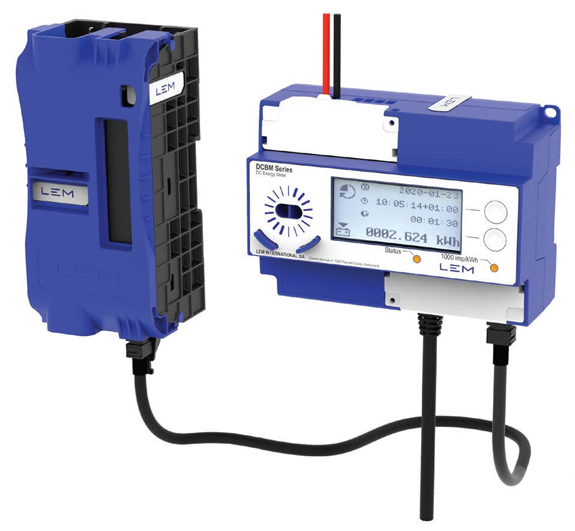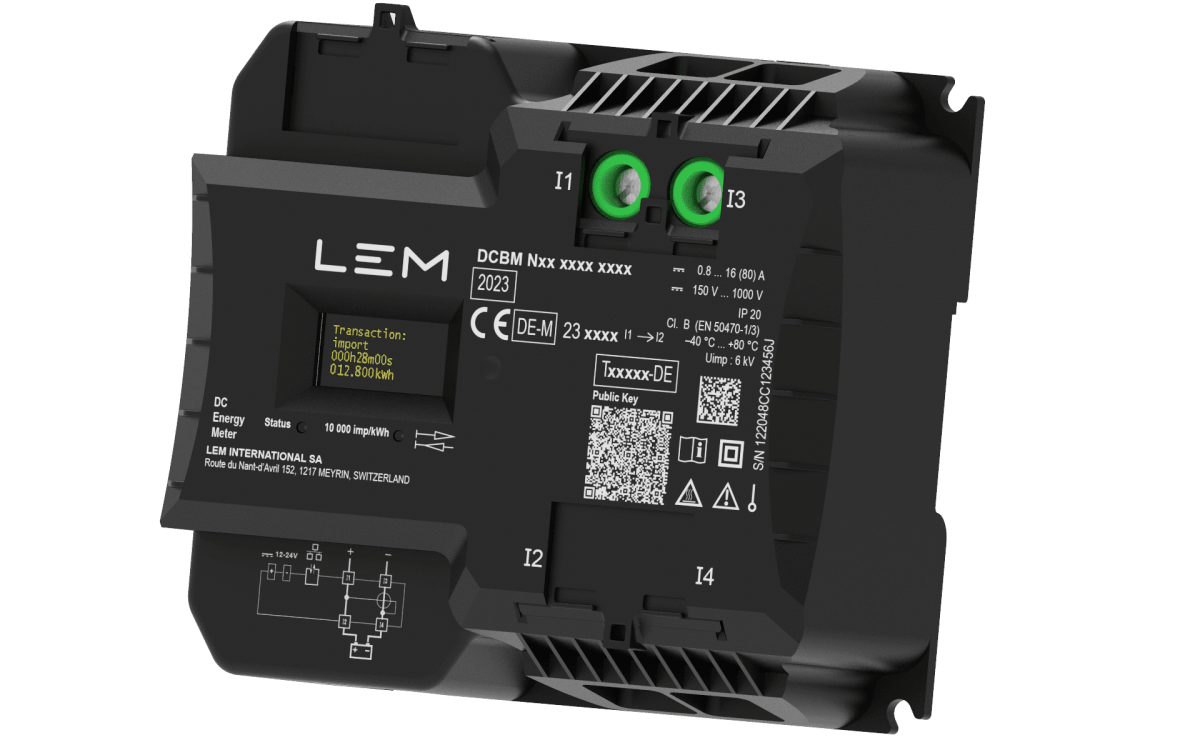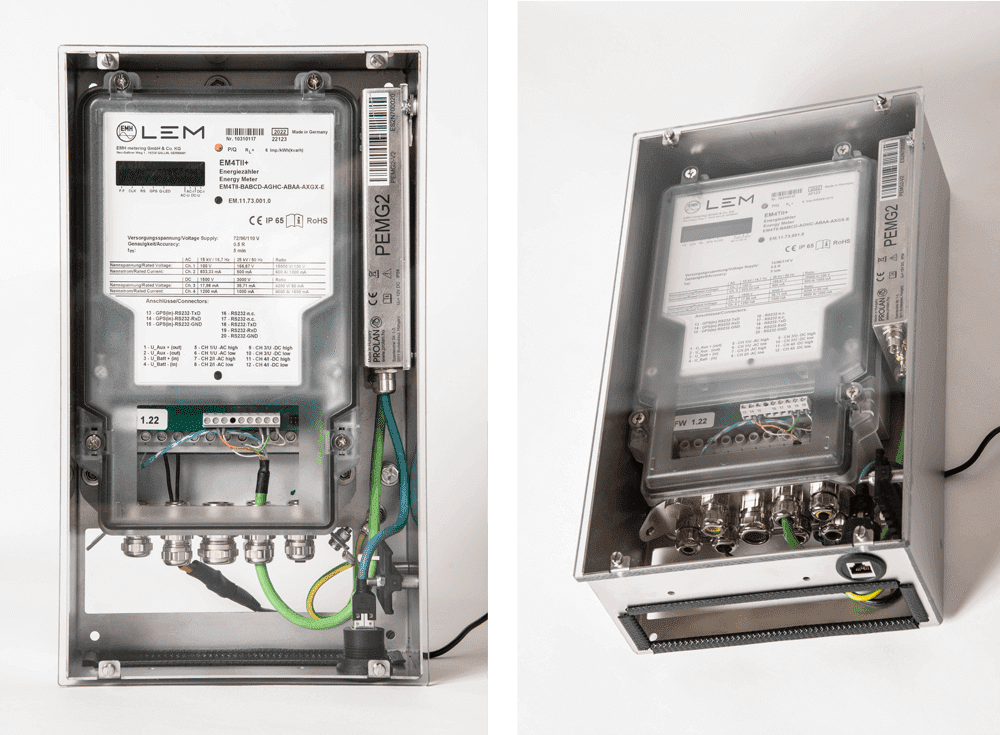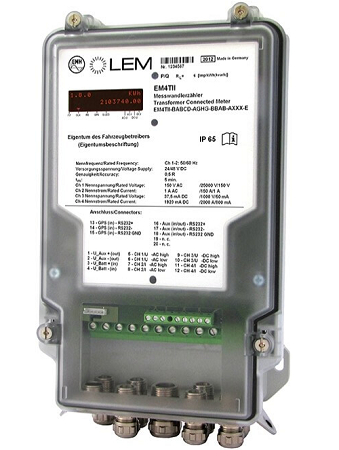ENERGY METERS
LEM provides a wide range of solutions allowing for the metering of energy is several areas. These solutions ensure its users to monitor real, precise, and controlled energy measurement.
Energy meters play a crucial role in the control and management of energy, offering key information for improving energy efficiency. Energy meters enable the trading of electricity and billing processes for both end users and businesses. Through energy meters, monitoring and energy consumption optimization can be achieved.
Metrology regulations such as the Measuring Instrument Directive (MID) in Europe, CTEP/NTEP in North America, secure accuracy, performance, and trustworthiness, providing a safeguard for both end users and system providers.
LEM’s energy meters can be integrated in a wide range of applications:
- Into electric vehicles supply equipment (EVSE)
- In battery storage systems and distributed energy resources (DER)
- In the railway market, into on-board energy measurement systems (EMS) and ground-based data collecting system (DCS)
Whether they are integrated into trains, electric vehicles, or fast chargers, energy meters serve the role of enhancing the management and optimization of energy usage.
One of the key attributes of these meters is their ability to furnish billing data that accurately reflects actual energy consumption. LEM's energy metering solutions are at the forefront of shaping the global landscape of metering technology, influencing how energy consumption is measured and managed across various applications.
DCBM 400 / 600

- Split concept for easy integration
- Range of operation 150 to 1000 V DC
- Two sizes: Imax 400 A and Imax 600 A
- Bi-directional energy metering
- Wide operating temperature range
Main features
- Easy integration into systems, perfect for electric vehicle DC fast chargers
- Flexible integration with busbars or cables
- OCMF readouts compliant with S.A.F.E
- Certified with all regulations in Europe (MID, Eichrecht, France)
- UL recognized
DCBM 100

- Voltage measurement 150 to 1000 V DC
- Current range 80A
- Bi-directional energy metering
Main features
- OpenAPI for easy integration into systems
- Flexible integration with cables
- For destination DC charging of electric vehicles
- OCMF readouts compliant with S.A.F.E
TEMA4G

- Accuracy < 0.5R according to EN 50463-2
- Compliant with EN 50463:2017
- 4 input channels for metering of both AC and DC signals of any existing traction network (600V DC to 3kV DC, 15kV AC 16,7Hz, 25kV AC 50Hz)
Main features
- Supports AC and DC rail networks
- Formatting of Compiled Energy Billing Data (CEBD)
- Connection available for GPS (NMEA), 2G/4G Antenna
EM4T II

- Accuracy <0.5R according to EN 50463-2
- Compliant with EN 50463:2017
- Can be utilized with power supplies (24V and 110V DC nominal)
- 4 input channels for metering of both AC and DC signals of any existing traction network (600V DC to 3kV DC, 15kV AC 16,7Hz, 25kV AC 50Hz)
Main features
- Measurement of consumed and regenerated active and reactive energy
- Timeframe for storing the load profiles between 1 to 15 minutes
- RS232, RS422 or RS485 type interface for data communication (via modem or local (protocol IEC 62056-21))
- IP 65
More about LEM’s energy metering
What is an energy meter?
An energy meter is a device designed to measure and monitor electrical energy consumption or production. LEM develops energy metering devices to monitor electrical parameters accurately in various applications.
These meters may also have features such as data logging, communication interfaces (like RS485 or Ethernet), and integration capabilities with control systems for real-time monitoring and control.
Energy meters plays a crucial role in billing, efficiency assessment, and overall system optimization.
Why use an energy meter?
Using an energy meter serves several important purposes:
- Billing and Cost Management: Energy meters are crucial for accurately measuring the amount of electricity consumed or supplied. In railway and electric vehicle DC fast chargers applications, billing based on accurate measurement and data trustworthiness is essential.
- Efficiency Monitoring: They enable operators and system owners to monitor the efficiency of the electrical systems and optimize energy consumption.
- Load Management: These meters assist in load management, especially for fast chargers and trains.
- System Optimization: They provide data that can be used to optimize the overall system.
- Environmental Impact Assessment: These solutions can also help assess the environmental impact of electric transportation.
- Regulatory Compliance: Energy meters are required to meet regulatory and legal requirements. They ensure that operators and service providers comply with regulations related to energy consumption, billing accuracy, and environmental reporting.
5 advantages of LEM energy meters?
LEM energy meters offer several advantages, making them a perfect choice for various applications. Here are five key advantages of using LEM energy meters:
- High Precision and Accuracy: LEM energy metering solutions are known for their precision and accuracy in measuring current and voltage.
- Wide Range of Applications: Meters are versatile and can be used across a wide range of applications, including fast chargers, battery storage, distributed energy resources, and traction.
- Compact and Robust Design: LEM meters are designed to be compact and robust. This makes them suitable for installation in challenging environments.
- Data trustworthiness: Many energy meters come with data authentication mechanisms, ensuring that metering data are trustworthy and immune to tempering.
- Long-Term Reliability: They are designed to have a long operational lifespan, reducing the need for frequent maintenance and replacement.
What are the applications where energy metering can make a difference?
Energy meters are commonly used in 2 areas:
- Electric Vehicle DC Fast Chargers: DC fast chargers are devices designed for the swift charging of electric vehicles. Within EV fast charger systems, energy meters play a critical role. They gauge the energy transferred between the charger and the electric vehicle during charging, ensuring precise billing and optimal charger performance. LEM solutions, such as the DCBM 400/600, offer high-precision energy meters specifically designed to meet the demands of fast charging infrastructure.
- Traction: In the context of trains, energy meters are employed to quantify the energy consumed during train operations. Electric trains derive their power from overhead lines or a third rail. These meters ensure precise energy billing based on actual consumption, eliminating the need for estimates. They also enable railway operators to monitor energy usage for accurate billing, optimize energy usage and fine-tune operational strategies.
Can we use energy meters anywhere?
As energy meters incorporate metering capabilities in accordance with legal metrology standards, LEM solutions guarantee both the accuracy and trustworthiness of processed data across various applications.
LEM collaborates closely with metrology departments in numerous countries worldwide to ensure compliance with local regulations for our energy meters.
Our Direct Current Billing Meter (DCBM) is compliant with Eichrecht standards in Germany, MID (Directive 2014/32/EU), French regulations and meet North American regulations (UL).
The EM4TII and TEMA4G on-board meters for trains are according to EN 50463:2017, enabling their use in all European countries.